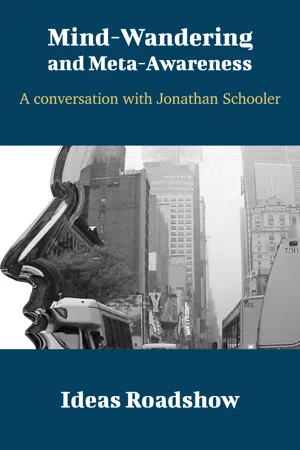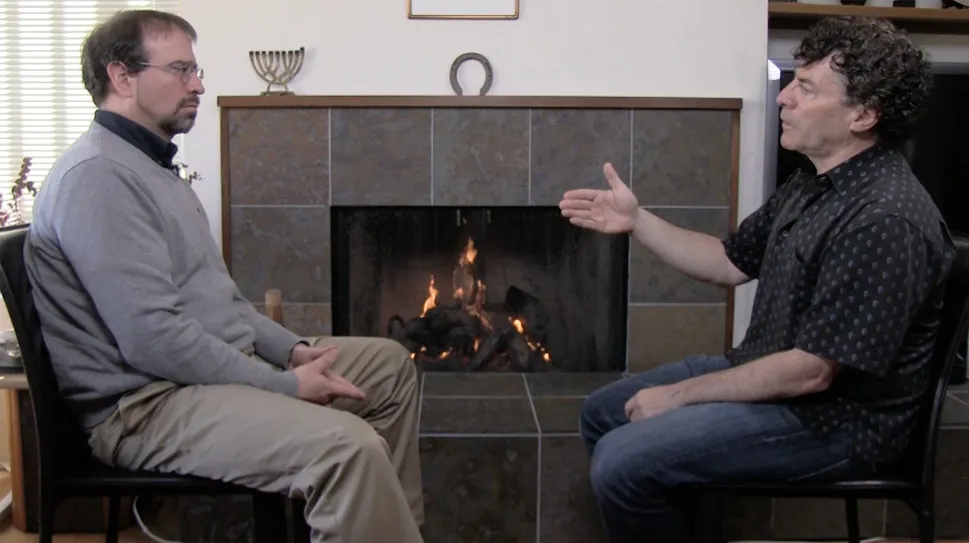![]()
The Conversation
![]()
I. Meta-Beginnings
Grappling with universal vagueness
HB: As the principal investigator at the META lab and somebody who’s been thinking about meta-issues for a long time, maybe you can start off by telling me what you mean by meta-awareness.
JS: Sure. Well, I sort of have the good news and the bad news about meta-awareness. The good news is that I can describe a particular experience that we’ve all had that I really think captures this notion. The bad news is that I’m not sure any of the research that I’m going to tell you about can top that. The personal experience that we’ve all had really just nails it and it’s really been hard to nail it quite as well as that experience.
HB: So it all goes downhill from here?
JS: I’m afraid so. Start with your strengths. Here’s the experience, and I’m sure you’ve had it: you’re reading along and, at some point, you suddenly realize that, although your eyes have been moving across the page, your mind has been completely elsewhere. Are you familiar with that experience?
HB: Yes, all too frequently.
JS: And when you tell people this, they always have this sheepish look that seems to say, “Yes. Welcome to my world. This happens to me all the time.” We all have this experience of reading and suddenly realizing, “Where have I been?” There’s a surprise to it. You’re actually startled by the fact that you’ve been reading this period of time.
The question is, Why do we do this? There are some situations, if you’re mind-wandering during a lecture for example, where you can’t just say, “Can you please stop talking? I’d like to mind-wander for a while.” But when you’re reading, you can stop and close the book. No one is insisting that you continue reading and yet, you do. The question is, why?
The conclusion that I came to was that you do this because you’ve lost track of the content of your own mind. Meta-awareness is that moment of realizing that you’ve been mind-wandering. It’s that taking stock of your current mental state and acknowledging what it is. In the case of mind-wandering while reading, it’s that you’ve been mindlessly reading. That’s really the essence of meta-awareness.
The idea is that we only periodically stop and take stock of what’s going on. For much of the day we are having experiences, what I call experiential consciousness, or just experience, but we’re not stopping to ask ourselves, “What is the experience that’s going on in my head right now?” The experience of mind-wandering while reading and catching yourself really captures that distinction.
HB: Right. You’ve talked about three different forms of consciousness: there is consciousness when you’re actually experiencing something directly; there is consciousness when you may be doing something subconsciously; and then you have the sense of being aware or not being aware of the fact that you’re having those experiences, which is at a meta-level, which hither to, it seems, hasn’t been given a whole lot of attention. Is that fair to say?
JS: Well, it comes and it goes. Certainly people, from time to time, talk about things like meta-cognitive awareness. There’s a whole literature that we can talk about on mindfulness and on cognition. So people have talked about these issues to some extent, but what they don’t routinely do is talk about how consciousness can be thought of at these three levels: the unconscious level, the experiential level, and the meta-conscious or meta-aware level. People often get these distinctions confused. I think that sometimes when people are talking about unconscious and conscious, what they really mean is the distinction between conscious and meta-conscious.
Freud talked about repression, keeping things out of consciousness That may happen. It may be that there are some things that are going on completely under the surface, that we are completely unaware of, that are somehow being kept out of mind.
But I think it’s also possible—and we have some research on this—that sometimes you can have thoughts but you just don’t let yourself notice that you’re having the thoughts. So a negative thought comes to mind and you just don’t acknowledge it. So that distinction between conscious and unconscious is something that hasn’t made it into meta-consciousness.
HB: How did it all start for you? Were you someone who had trouble paying attention while you were reading? Or had you always been interested in meta-issues? I want to talk about mind-wandering, but there are other issues, with respect to emotion for example, that you look at from a meta-level. You run the META lab. These are clearly ideas that look at the bigger picture, that get outside the box. You can use whatever metaphor you want, but you are clearly motivated to look at things from a greater position of abstraction. Have you always been driving in this direction in terms of research?
JS: I think that my general mode of thinking—I’m just not really good at the tiny details. That’s just not my strong suit. It seems like my strength is being able to step back and look at the big picture and ask questions about how things relate to each other, and just sort of look at the larger issues. So, to some degree, it was out of necessity, because my strength is not working out detailed models.
You asked about how I came to study meta-awareness. That actually started with looking at some work of a colleague of mine, and a dear friend, Dan Wegner, who had a theory about ironic processes. Basically, the idea is that when you try to not think about a thought, you have two processes that are going on simultaneously. On the one hand, you have this control process, which is trying to think about anything but the unwanted thought. In this particular case, the task involved trying not to think about white bears. So you have this one control process which is trying to think about anything but white bears, and then you’ve got another automatic process, which is looking for white bears so it can say, “Look, there’s a white bear. Don’t think about it.”
The question that arose from all this was, What is that automatic process searching? Where is it searching? Wegner said that it was searching pre-consciousness, which seemed possible, but it occurred to me that it could actually be searching consciousness, because you can be thinking about a white bear without noticing that you’re thinking about a white bear. This was the key insight that I had. So it was in thinking about what the monitoring process was searching and realizing that you could think about something and not notice that you’re thinking about something, that made me realize that we need a monitor for what’s going on in the current contents of thought.
We’ve actually done research where we tell people to try not to think about a relationship and then we ask them to press a button every time they notice themselves thinking about the relationship. Then, in addition, we probe them periodically. We ask “Just now, were you thinking about that relationship?” And what we find is that we routinely catch people thinking about it before they notice it themselves. Again, this is reiterating the point that often we can be thinking about something and yet, not notice that we’re thinking about it.
HB: It seems that a theme throughout your work, and one of your motivations, is this distinction between the personal, experiential nature of things, and the description from outside of what’s actually going on. Is that fair to say?
JS: That’s absolutely right. A real passion of mine is trying to find a balance, a marriage, in effect, between the two fundamentally different ways in which we understand the world. We understand the world, in my opinion, first and foremost, from a first-person perspective. The thing that we know beyond certainty, more than anything else, is our own personal experience. We always start with that. However, as scientists, we need to somehow find a third-person perspective to communicate and find consensus in scientific observation. It’s the challenge of finding that balance between the first-person and the third-person perspective that really captivates me.
HB: I could imagine that a hardcore neuroscientist might say, “Jonathan, you’re misguided here. There is no difference between these things. If our technology gets better, we’ll be able to put someone in the futuristic equivalent of an MRI machine and see what he or she is thinking. We’ll have a transparent model of what’s actually going on inside their head and we’ll be able to describe their experiences perfectly well from the outside.” That is my sense of what a hardcore neuroscientist would say and I’m guessing you’ve probably met a few people like that in your time. What would your response be to that?
JS: Dan Dennett was here at UCSB and we had long dialogues about exactly...

